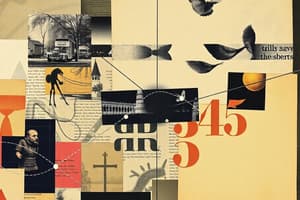Podcast
Questions and Answers
What is the main focus of Chapter 3?
What is the main focus of Chapter 3?
Obsessive-compulsive and related disorders
Which category was removed from the anxiety disorders in DSM-5?
Which category was removed from the anxiety disorders in DSM-5?
Which of the following disorders are included in the obsessive-compulsive and related disorders category? (Select all that apply)
Which of the following disorders are included in the obsessive-compulsive and related disorders category? (Select all that apply)
Compulsive disorders and impulsive disorders are the same.
Compulsive disorders and impulsive disorders are the same.
Signup and view all the answers
What are compulsive disorders primarily characterized by?
What are compulsive disorders primarily characterized by?
Signup and view all the answers
What is another name for trichotillomania?
What is another name for trichotillomania?
Signup and view all the answers
What is the primary differentiator between compulsive and impulsive behaviors?
What is the primary differentiator between compulsive and impulsive behaviors?
Signup and view all the answers
According to the document, what is one disorder considered largely unique among the obsessive-compulsive related disorders?
According to the document, what is one disorder considered largely unique among the obsessive-compulsive related disorders?
Signup and view all the answers
Study Notes
Overview of Obsessive-Compulsive Disorders
- The DSM-5 created a distinct category for obsessive-compulsive and related disorders, separating it from anxiety disorders present in DSM-4.
- This new category includes obsessive-compulsive disorder (OCD) and several related disorders such as body dysmorphic disorder (BDD), hoarding disorder, trichotillomania (hair-pulling disorder), and excoriation (skin-picking disorder).
- Trauma and stress-related disorders are another newly defined category in the DSM-5, incorporating post-traumatic stress disorder (PTSD) and acute stress disorder.
Relationship Between Disorders
- Obsessive-compulsive and related disorders share a common component of anxiety, similar to anxiety disorders.
- Many etiological models and treatments, especially exposure-based treatments, are applicable to both OCD-related disorders and trauma/stress-related disorders.
Details of Included Disorders
- Body Dysmorphic Disorder (BDD): Focused extensively due to the availability of research and knowledge in this area.
- Hoarding Disorder: Considered distinct in its characteristics.
- Trichotillomania and Excoriation: These disorders exhibit repetitive behaviors that are driven by different processes compared to compulsive disorders.
Argument of Validity
- Researchers debate the classification of these disorders together, suggesting that there might be three main groups:
- Compulsive Disorders: Including OCD and BDD, characterized by actions driven by an internal compulsion despite negative consequences.
- Impulsive Disorders: Including trichotillomania and excoriation, where individuals act quickly without forethought.
- Hoarding Disorder: Arguably unique, differing significantly from the compulsive and impulsive group.
Learning Objectives
- Each chapter outlines specific learning objectives, with varying wording based on different authors. Focus primarily on OCD-related learning objectives for detailed understanding of the disorder's nature and diagnosis.
Studying That Suits You
Use AI to generate personalized quizzes and flashcards to suit your learning preferences.
Related Documents
Description
Dive into Chapter 3 of Psychology, focusing on obsessive-compulsive disorders and related conditions. This quiz will explore the changes made from DSM-IV to DSM-5 regarding anxiety and obsessive-compulsive disorders. Test your understanding of these mental health issues and their classifications.




